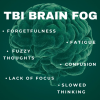For months after having Covid-19, 37-year-old Chelsea Alioner struggled with headaches, dizziness, and brain fog so intense she said “it felt like early dementia,” according to an interview in the New York Times. Chelsea is part of a group who have been sick with Covid for over 80 days. We’ve all heard of Covid Brain Fog by now and some have even been unlucky enough to experience it first-hand.
The more doctors and scientists learn about the coronavirus, the more they realize that the pulmonary effects are just the beginning.
Chelsea’s vision would blur, and she would forget words she knew. Severe fatigue was a daily occurrence, and her fingers and toes would often be numb.
Experts are finding that the coronavirus brain connection is more devastating than anyone ever thought. According to research from New York University in October, the virus causes brain injury in 1 out of every 7 people.
The injuries run the gamut from temporary confusion to seizures and sometimes strokes. The good news is they occur without the virus directly entering the brain so no immediate invasion. This study suggests that brain injuries are a secondary effect of loss of oxygen.
These secondary complications of Covid-19 are very serious as they raise the risk of patient death in the hospital by 38%. They also increase the likelihood of needing rehabilitation therapy after their stay in the hospital by 28%.
While the virus is known to attack other organs like the blood vessels and the heart, its main target is the lungs. The virus starves the body of oxygen which leads to confusion, strokes, comas, and permanent brain damage.
“Our study results suggest that physicians need to be more aggressive in stabilizing body oxygen levels in patients with Covid-19 as a potentially key therapy for stopping, preventing, and or possibly reversing neurological problems,” says study lead Dr. Steven Galetta.
China and the UK
Reports from both China and Europe have also raised the alarm about possible brain damage from coronavirus infection. The UK reported that over 40 thousand people developed encephalitis and other severe neurological issues related to Covid-19. The patients who had the worst brain swelling had mild repository issues. “This was the brain being hit as their main disease,” according to Benedict Michael, a neurologist at the University of Liverpool.
Although the viruses can invade and infect the brain, it doesn’t do so to a significant extent. Neurological issues could be a result of overstimulation of the immune system. But one thing is for sure, it’s important to find out because these two scenarios require entirely different treatments. Researchers are scrambling to answer key questions.
It’s Getting Scary
The more we learn about the coronavirus, the more we understand it’s not just a respiratory infection. The virus can ravage vital organs, the brain, and the nervous system. A woman in her 50s with no psychiatric history was diagnosed with developing psychosis after contracting the disease. She started seeing lions and monkeys in her house and was aggressive towards her family. She was convinced her husband was an impostor.
 “The neurological symptoms are only becoming scarier,” says UCSD neuroscientist Alysson Muotri.
“The neurological symptoms are only becoming scarier,” says UCSD neuroscientist Alysson Muotri.
If you have any of the symptoms, see your physician immediately. Get scanned, get brain imaging, and do blood work.
Damage Control
In the early days of Covid-19, doctors and nurses just did damage control. They focused on keeping patients breathing and treating their lungs. But even then, the evidence for brain damage and neurological problems was accumulating. Hospitals now are on the lookout for signs of brain damage like confusion, delirium, agitation, and disorientation.
Due to the massive size of the pandemic, tens of thousands of people already have neurological symptoms and will be facing lifelong struggles. Contact us for a FREE consultation TODAY and get your life back on the road to brain injury recovery.



